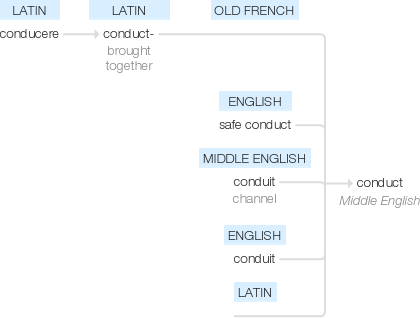Conduct
Middle English: from Old French, from Latin conduct- ‘brought together’, from the verb conducere . The term originally denoted a provision for safe passage, surviving in safe conduct; later the verb sense ‘lead, guide’ arose, hence ‘manage’ and ‘management’ (late Middle English), later ‘management of oneself, behaviour’ (mid 16th century). The original form of the word was conduit, which was preserved only in the sense ‘channel’ (see conduit); in other uses the spelling was influenced by Latin.
wiktionary
From Late Latin conductus(“defense, escort”), from Latin conductus, perfect passive participle of condūcō(“bring together”); see also conduce. Doublet of conduit.
etymonline
conduct (v.)
early 15c., "to guide, accompany and show the way," from Latin conductus, past participle of conducere "to lead or bring together; contribute, serve," from assimilated form of com "with, together" (see con-) + ducere "to lead" (from PIE root *deuk- "to lead").
Sense of "to lead, command, direct, manage" is from mid-15c., originally military. General meaning "to direct, manage, act as leader of" is from 1630s; especially of a musical performance (1791).
Meaning "behave in a certain way" is from 1710. In physics, "to carry, convey, transmit," 1740. Related: Conducted; conducting. An earlier verb in the same sense was condyten (c. 1400), which goes with conduit.
To conduct is to lead along, hence to attend with personal supervision; it implies the determination of the main features of administration and the securing of thoroughness in those who carry out the commands; it is used of both large things and small, but generally refers to a definite task, coming to an end or issue: as, to conduct a religious service, a funeral, a campaign. [Century Dictionary]
conduct (n.)
mid-15c., "action of guiding or leading, guide" (in sauf conducte), from Medieval Latin conductus, from past-participle stem of Latin conducere "to lead or bring together," from assimilated form of com "with, together" (see con-) + ducere "to lead" (from PIE root *deuk- "to lead"). Sense of "personal behavior" is first recorded 1670s. A doublet of conduit.
